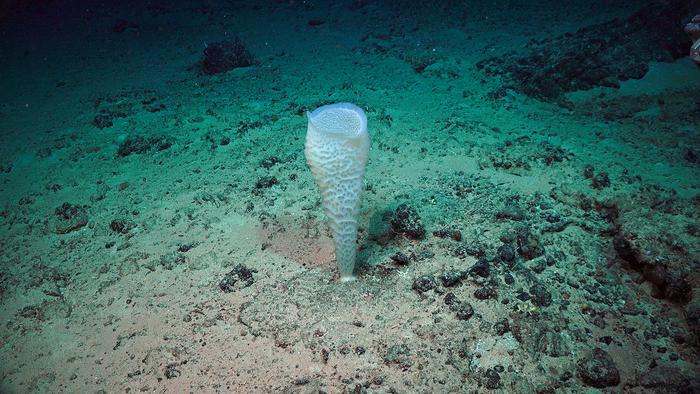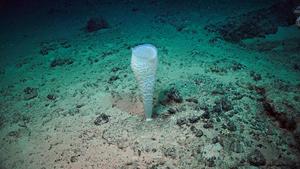
image:
A sponge in the western Indian Ocean, photographed with ROV MARUM-SQUID during SO 306 expedition. Photo: MARUM – Center for Marine Environmental Sciences, University of Bremen
Credit: Photo: MARUM – Center for Marine Environmental Sciences, University of Bremen
Dr. Tanja Stratmann’s project, titled “Nitrogen Cycling in Modern Sponges with Clues About Their Role in Past Oceans” (SPYCLING for short), focuses on marine sponges as representatives of the oldest animal groups still in existence. She aims to investigate how sponges have processed the essential nutrient nitrogen since ancient times and thereby have shaped their ecosystems.
Sponges are among the oldest multicellular organisms on Earth and can be found in all types of bodies of water, from canals to lakes, rivers, and deep sea environments. Like carbon, nitrogen has two stable isotopes that can be used to determine an organism’s position in the food web. However, there has been a lack of in-depth understanding of nitrogen cycling processes in the various classes of sponges. Most sponges feed by filtering water. “We have an idea of what their chemical profile should look like,” says Stratmann. “But in reality the profile of glass sponges was even more extreme than we had previously assumed and did not necessarily align with their feeding habits.” Although there are hundreds of taxonomically described species of glass sponges, their function in their ecosystem remains unclear.
Due to the large biomass that sponges reach at some locations and their filtering capacity, they can significantly influence local biogeochemical cycles. Throughout Earth’s history, sponges have formed symbiotic communities with microorganisms that sometimes contribute to nitrogen supply and alter conditions in their immediate surroundings, as Dr. Stratmann notes in her project description.
For her project, Dr. Stratmann will use incubation chambers in the deep sea, which she has previously employed off the coasts of New Zealand and in the Central Pacific. “Glass sponges living at a water depth of about 4,000 meters cannot be studied on the surface, only in their natural habitat,” explains the scientist. Data will be collected over three to four days, after which the incubation chambers will be removed.
In the coming years, Stratmann will also study fossil sponges using a new method: extracting nitrogen-containing compounds from ancient sponges and determining their isotope patterns. “It’s not about the age of the organisms, but about the nitrogen cycle,” she emphasizes. To this end, she collaborates with natural history museums across Europe that have extensive collections to decode the function of sponges in their past ecosystems.
Determining Past Environmental Conditions
“Studying the nitrogen cycle in fossilized sponges allows us to infer how sponges and their symbionts processed nitrogen during their lifetimes. Based on these results, I will gain valuable information about the marine environmental conditions that existed when the sponges were formed,” Stratmann explains.
Her return to the University of Bremen, where she completed part of her biology degree, marks an exciting new chapter in her research career. After a stint in Denmark, she earned her doctorate from the NIOZ – Royal Netherlands Institute for Sea Research and Ghent University in Belgium. In 2021, she received the prestigious Veni scholarship in the Netherlands, enabling her to investigate the metabolic activity of individual benthic animals in deep-sea habitats over a three-years period. Her decision to bring her grant to the University of Bremen is rooted in MARUM’s excellent facilities: “The wide range of equipment for biogeochemical methods is not available everywhere.”
She will be based at MARUM from February 2026.
MARUM Director Kai-Uwe Hinrichs is delighted about the prestigious project: “With Tanja Stratmann, we are gaining an exciting and innovative project of great importance for life in the deep sea. At the same time, she strengthens our expertise in biogeochemistry and ecology of benthic organisms – inhabitants of a habitat increasingly threatened by human influences.”
About the ERC Starting Grant
This year, the ERC Starting Grant will be awarded to 478 top early-career researchers from across Europe, selected from 3,928 applications. This prestigious grant recognizes excellent researchers two to seven years after they have completed their Ph.D.s. The grant funds groundbreaking basic research with up to €1.5 million over five years, enabling recipients to independently implement their research ideas with their teams.
About MARUM
MARUM – Center for Marine Environmental Sciences at the University of Bremen generates fundamental scientific knowledge about the role of the ocean and the ocean floor in the Earth system. Dynamic interactions between the geological, physical, biological, and chemical processes at and with the ocean floor significantly influence the entire Earth system. These dynamics affect the climate system and the global carbon cycle, creating unique biological systems. MARUM is committed to fundamental and open-ended research, conducted with a sense of responsibility toward society, for the benefit of the marine environment, and in alignment with the United Nations’ sustainability goals. It publishes high-quality, peer-reviewed scientific data, making it freely accessible to all. MARUM informs the public about new discoveries in marine environmental science and engages in dialogue with society to provide actionable knowledge. Collaborations between MARUM and companies or industry partners are pursued while upholding its commitment to protecting the marine environment.
Further Information:
About the ERC Starting Grant: https://erc.europa.eu/homepage
ERC press release: https://erc.europa.eu/news-events/news/erc-2025-starting-grants-results
Contact:
Dr. Tanja Stratmann
Royal Netherlands Institute for Sea Research (NIOZ)
Department of Ocean Systems (OCS)
Email: Tanja.Stratmann@nioz.nl
Utrecht University
Department of Earth Sciences
Email: t.stratmann@uu.nl
Prof. Kai-Uwe Hinrichs
Director of MARUM− Center for Marine Environmental Sciences
University of Bremen
Organic Geochemistry
Email: khinrichs@marum.de
Disclaimer: AAAS and EurekAlert! are not responsible for the accuracy of news releases posted to EurekAlert! by contributing institutions or for the use of any information through the EurekAlert system.

